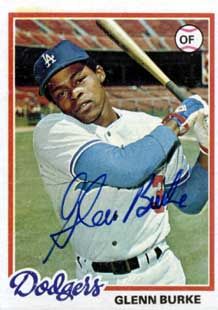Two former Dodgers players, Glenn Burke and Steve Bilko, were elected to the Baseball Reliquary’s Shrine of the Eternals on Sunday in Pasadena. The Shrine of the Eternals is the national organization’s equivalent to the Baseball Hall of Fame.
Via baseballreliquary.org, here’s more about the two inductees:
Elected to the Shrine of the Eternals in his fourth year on the ballot, STEVE BILKO (1928-1978) was not a star in the big leagues. Over a peripatetic ten-year career, he was a regular for only one season (1953, with the Cardinals), and he appeared in more than 100 games only one other time (1961, with the expansion Angels). He could hit for power, but struck out too often. He had no speed. To explain the lingering mystique of this moon-faced, lumbering first baseman, we must look at the Pacific Coast League, with franchises located along the West Coast and featuring a prolonged weather-friendly playing season, competitive pennant races and playoffs, and a rabidly partisan fan base. When residents of Los Angeles, San Diego, Seattle, Sacramento, or other western cities thought of pro baseball, they thought of the PCL, not the far-distant American or National Leagues. The PCL produced great baseball until the Dodgers and Giants relocated to Los Angeles and San Francisco, respectively, in 1958, thus reducing the PCL to permanent minor-league status. In those waning years of PCL supremacy, Bilko was the slugging star for the Los Angeles Angels, who wowed fans with mammoth home runs and exceptionally fierce strikeouts. He led the PCL in home runs for three consecutive seasons from 1955 to 1957, winning the league Triple Crown in 1956 with a .360 average, 55 HRs, and 164 RBI. He was by far the biggest sports star in Los Angeles history prior to the arrival of the Dodgers.
His pop culture profile was so huge that when comedian Phil Silvers needed a name for a character in his new television sitcom, he picked Bilko. Recognizing his popularity with local fans, the Dodgers added Bilko to their roster as a gate attraction for their inaugural campaign in Los Angeles. The Angels (the American League expansion team) did likewise in 1961, providing Bilko with a final chance to awe the fans at his old haunt, Los Angeles’s Wrigley Field. For those who saw him play in the PCL, he will always be remembered as a superstar. That his glory years coincided with the demise of a much-loved league adds a last wistful touch to his legend.
Elected to the Shrine of the Eternals in his eighth year on the ballot, GLENN BURKE (1952-1995) was a fleet, capable outfielder for the Los Angeles Dodgers and Oakland Athletics during a four-year major league career from 1976 through 1979. He was the first big league ballplayer to publicly acknowledge he was gay. Although his public disclosure came after he had retired, Burke’s sexual preference was well known during his playing days, and he encountered widespread homophobia from locker rooms to board rooms. In his 1995 autobiography, Out at Home: The Glenn Burke Story, he revealed that Dodgers’ management, in an attempt to conceal his homosexuality, offered to pay for Burke’s honeymoon if he would agree to marry a woman. While never given an everyday opportunity with the Dodgers to show his mettle, Burke did make one lasting contribution to popular culture while with the team. After Dusty Baker’s 30th home run at the end of the 1977 season—a feat which made the Dodgers the only team at that time to have four different players hit 30 or more taters—Burke raised his hands in celebration at home plate. As Baker crossed the plate he reached up, slapped one, and the high-five was born. Having appeared in just over 100 games for Los Angeles during parts of three seasons, Burke was sent packing to Oakland. Returning to his hometown didn’t make Burke’s life any easier. A’s manager Billy Martin made public statements about not wanting a homosexual in his clubhouse, a clear reference to Burke. After just two years with the A’s, Burke quit baseball in frustration. He became active in amateur athletic competition after baseball, competing in the 1982 and 1986 Gay Games in basketball and track. Burke’s life then went into a tailspin. Cocaine addiction and an accident that crushed his leg and foot led to years of physical misery, bouts with the law, and homelessness. He died of complications from AIDS-related illness in 1995. A documentary, Out: The Glenn Burke Story, was released in 2010. “They can’t ever say now that a gay man can’t play in the majors,” Burke stated, “because I’m a gay man and I made it.”

